-
 Bitcoin
Bitcoin $108,489.6704
1.13% -
 Ethereum
Ethereum $2,502.0528
2.92% -
 Tether USDt
Tether USDt $1.0002
0.00% -
 XRP
XRP $2.1941
0.51% -
 BNB
BNB $655.3375
1.00% -
 Solana
Solana $151.5977
1.27% -
 USDC
USDC $0.9999
0.00% -
 TRON
TRON $0.2768
0.32% -
 Dogecoin
Dogecoin $0.1676
2.86% -
 Cardano
Cardano $0.5675
0.98% -
 Hyperliquid
Hyperliquid $40.6109
7.48% -
 Bitcoin Cash
Bitcoin Cash $500.7746
2.09% -
 Sui
Sui $2.8328
2.03% -
 Chainlink
Chainlink $13.4452
1.26% -
 UNUS SED LEO
UNUS SED LEO $9.1623
0.39% -
 Avalanche
Avalanche $18.2267
2.24% -
 Stellar
Stellar $0.2382
0.00% -
 Toncoin
Toncoin $2.8885
1.68% -
 Shiba Inu
Shiba Inu $0.0...01159
0.91% -
 Litecoin
Litecoin $87.1827
0.88% -
 Hedera
Hedera $0.1511
2.90% -
 Monero
Monero $315.4992
-0.59% -
 Polkadot
Polkadot $3.4663
2.34% -
 Bitget Token
Bitget Token $4.6118
-0.65% -
 Dai
Dai $1.0000
-0.01% -
 Ethena USDe
Ethena USDe $1.0003
0.02% -
 Uniswap
Uniswap $7.2989
4.69% -
 Pepe
Pepe $0.0...01003
5.73% -
 Aave
Aave $275.5616
7.15% -
 Pi
Pi $0.5181
-2.49%
Is it worth adding to the position after the MACD golden cross steps back to the zero axis?
A MACD golden cross followed by a return to the zero axis may signal a second entry opportunity, especially if momentum remains bullish and volume holds steady.
Jun 29, 2025 at 11:14 pm
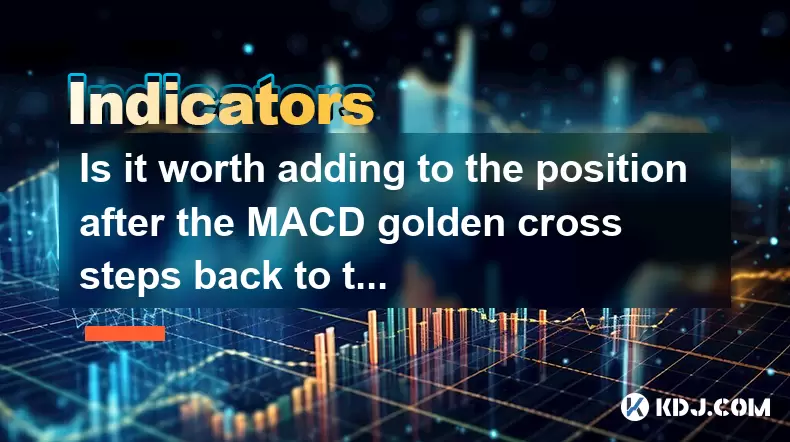
Understanding the MACD Golden Cross in Cryptocurrency Trading
The MACD (Moving Average Convergence Divergence) indicator is one of the most commonly used technical analysis tools in cryptocurrency trading. A MACD golden cross occurs when the MACD line crosses above the signal line, typically signaling a potential bullish trend. This event often draws attention from traders who are looking to enter long positions. However, many traders wonder whether it's wise to add to their position after the MACD golden cross steps back to the zero axis.
Before delving into that question, it’s essential to understand how the MACD works and what each component represents. The MACD line is calculated by subtracting the 26-period exponential moving average (EMA) from the 12-period EMA. The signal line is a 9-period EMA of the MACD line itself. When the MACD line crosses above the signal line, it creates a golden cross, suggesting upward momentum.
What Happens When the MACD Steps Back to the Zero Axis?
After a golden cross forms, the MACD line may move closer to or touch the zero axis before continuing its upward trajectory. The zero axis acts as a central pivot point for the MACD line. If the MACD line returns to this level after a golden cross, it could indicate that the initial momentum has weakened temporarily but hasn't necessarily reversed.
Traders often interpret this scenario as a possible consolidation phase rather than a reversal. In such cases, the MACD stepping back to the zero axis may offer a second entry opportunity for those who missed the initial golden cross or wish to add to an existing position at a potentially better price.
It’s crucial to analyze volume during this phase. If volume remains stable or increases while the MACD approaches the zero line, it can suggest continued interest in the asset despite short-term hesitation in price movement.
Evaluating Market Context Before Adding to Position
Adding to a position should never be done in isolation without considering the broader market environment. In cryptocurrency markets, volatility is high, and trends can change rapidly. Therefore, understanding the context becomes vital.
If the broader market is bullish and the specific cryptocurrency you're watching is showing relative strength, then adding to your position near the zero axis following a golden cross might be justified. On the other hand, if the overall market sentiment is bearish or there are strong resistance levels nearby, entering again could carry significant risk.
Technical indicators like RSI (Relative Strength Index) and Bollinger Bands can provide additional insight into overbought or oversold conditions. For example, if RSI is below 50 and rising, it supports the idea of a healthy pullback rather than a reversal.
Additionally, monitoring support and resistance levels around the current price can help determine whether the pullback to the zero axis is part of a healthy trend continuation or a breakdown in momentum.
Practical Steps to Confirm Entry After MACD Returns to Zero Line
If you're considering adding to your position after the MACD golden cross steps back to the zero axis, here are several practical steps you can follow:
- Confirm that the MACD line is still above the signal line even as it approaches the zero axis.
- Check for candlestick patterns that suggest continuation, such as bullish engulfing patterns or hammer formations.
- Ensure that volume doesn’t drop significantly during the pullback; sustained volume indicates ongoing buying pressure.
- Look for higher lows on the price chart, which align with the MACD behavior and confirm strengthening momentum.
- Use a trailing stop-loss strategy to protect your investment if the trend reverses unexpectedly.
These steps help filter out false signals and ensure that the MACD returning to the zero axis isn’t a sign of weakness, but rather a temporary pause in an ongoing uptrend.
Risk Management Considerations When Adding to Positions
One of the most overlooked aspects of trading is proper risk management, especially when adding to positions. It’s easy to get caught up in momentum and overcommit capital based on a single indicator signal.
A prudent approach would involve adjusting your position size based on the strength of the confirmation signals. If multiple indicators align with the MACD signal, you might consider increasing exposure slightly. However, never risk more than a predetermined percentage of your portfolio on any single trade.
Also, consider using partial profit-taking strategies. For instance, if your initial position is already profitable, you can take partial profits off the table and allow the remaining portion to ride with a tighter stop-loss.
This way, you’re locking in gains while still participating in potential further upside. Remember, in crypto trading, preserving capital is just as important as capturing gains.
Frequently Asked Questions
Q: What does the MACD zero axis represent?
The MACD zero axis is the point where the MACD line equals zero — essentially where the 12-period EMA and 26-period EMA intersect. Crossing above this line suggests positive momentum, while crossing below indicates negative momentum.
Q: Can I rely solely on MACD signals for trading decisions?
While the MACD is a powerful tool, relying solely on it can lead to misleading signals. Always use it in conjunction with other indicators and price action analysis for better accuracy.
Q: Should I add to my position if the MACD drops below the zero axis after a golden cross?
If the MACD drops below the zero axis after a golden cross, it may indicate a failed setup. Wait for reconfirmation before considering any new entries or additions.
Q: How long should I wait before adding to a position after the MACD touches the zero line?
There’s no fixed time frame. Focus on price action and confirmation signals. Some setups may develop within hours, while others might take days to solidify.
Disclaimer:info@kdj.com
The information provided is not trading advice. kdj.com does not assume any responsibility for any investments made based on the information provided in this article. Cryptocurrencies are highly volatile and it is highly recommended that you invest with caution after thorough research!
If you believe that the content used on this website infringes your copyright, please contact us immediately (info@kdj.com) and we will delete it promptly.
- Ripple, Stablecoin, Adoption: RLUSD Leading the Charge
- 2025-06-30 14:30:12
- Bitcoin ETF, IBIT, and the Bull Flag: Is $144,000 on the Horizon?
- 2025-06-30 14:50:12
- Bitcoin, Passive Income, and a Bull Raise: Riding the Crypto Wave
- 2025-06-30 14:30:12
- Bitcoin, Personal Loans, and Omega 88: A New Era in Lending?
- 2025-06-30 15:09:14
- Saylor's Strategy: How MicroStrategy's Bitcoin Bet is Reshaping Finance
- 2025-06-30 14:52:14
- Metaplanet's Bitcoin Blitz: From Zero to Hero in the Corporate Treasury Race
- 2025-06-30 15:10:54
Related knowledge
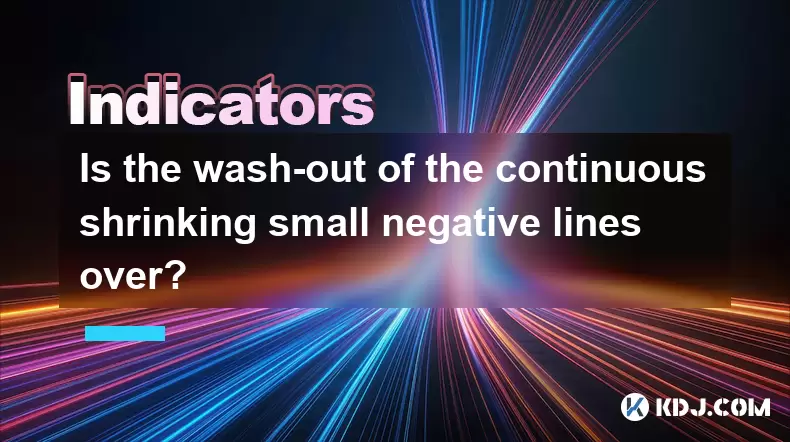
Is the wash-out of the continuous shrinking small negative lines over?
Jun 30,2025 at 12:21pm
Understanding the Concept of Wash-Out in Cryptocurrency MarketsIn cryptocurrency trading, a wash-out refers to a sharp price decline that forces weak-handed traders and investors to liquidate their positions. This often happens when a series of small negative candlesticks appear on the chart, indicating bearish sentiment without a significant breakout. ...
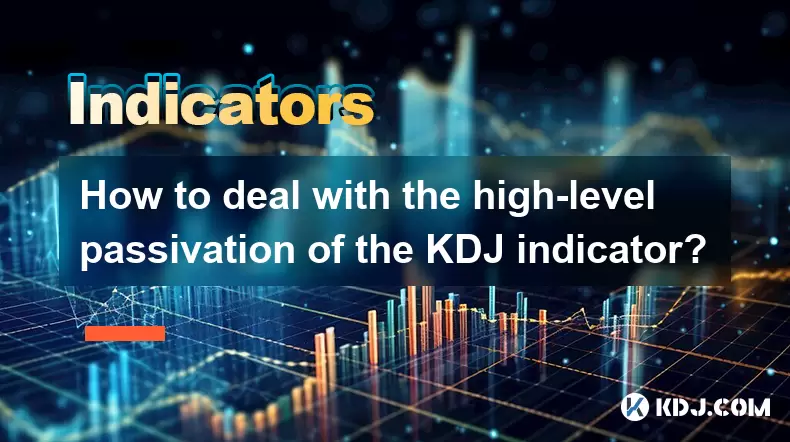
How to deal with the high-level passivation of the KDJ indicator?
Jun 30,2025 at 02:14pm
Understanding the KDJ Indicator and Its Role in Cryptocurrency TradingThe KDJ indicator, also known as the stochastic oscillator with J line modification, is a momentum-based technical analysis tool widely used in cryptocurrency trading. It consists of three lines: K, D, and J, which reflect overbought and oversold conditions. Traders often rely on it t...
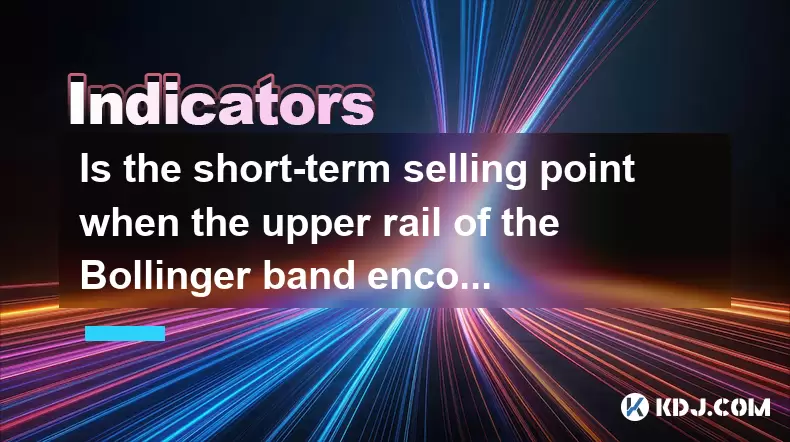
Is the short-term selling point when the upper rail of the Bollinger band encounters resistance and falls back?
Jun 30,2025 at 03:29pm
Understanding Bollinger Bands and Their Role in TradingBollinger Bands are one of the most widely used technical indicators in cryptocurrency trading. They consist of three lines: a simple moving average (SMA) in the middle, typically set to 20 periods, and two outer bands that are standard deviations away from the SMA—usually set at 2 standard deviatio...
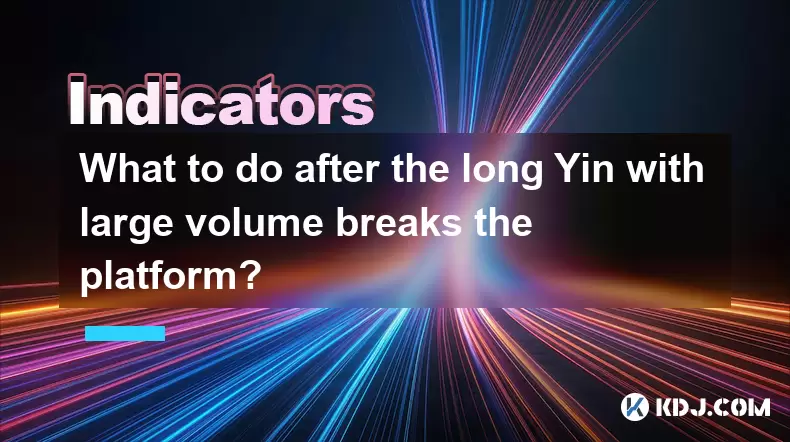
What to do after the long Yin with large volume breaks the platform?
Jun 30,2025 at 03:07pm
Understanding the Long Yin with Large Volume PatternA long Yin refers to a candlestick pattern where the price opens higher but closes significantly lower, forming a long red (or bearish) candle. When this occurs alongside large trading volume, it signals strong selling pressure and a potential shift in market sentiment. If this pattern breaks a previou...
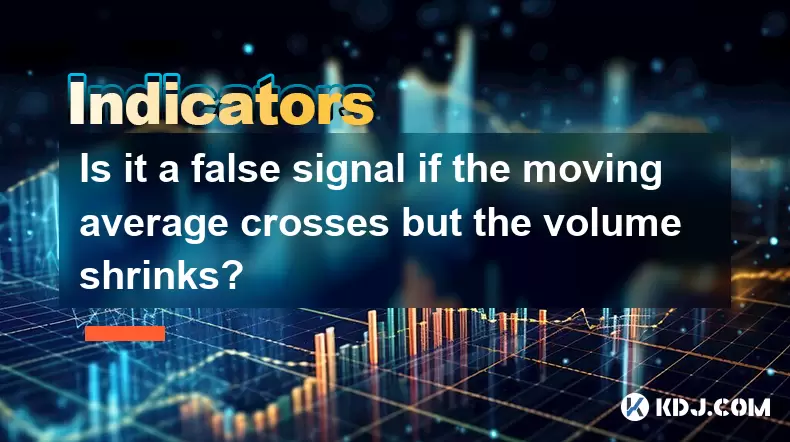
Is it a false signal if the moving average crosses but the volume shrinks?
Jun 30,2025 at 03:21pm
Understanding Moving Average CrossoversA moving average crossover is one of the most commonly used technical indicators in cryptocurrency trading. It involves plotting two moving averages — typically a short-term (e.g., 9-day) and a long-term (e.g., 21-day) — on a price chart. When the shorter-term moving average crosses above the longer-term one, it's ...
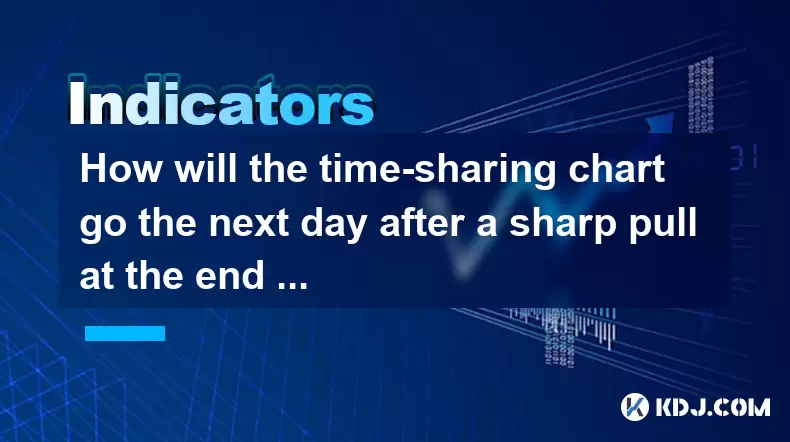
How will the time-sharing chart go the next day after a sharp pull at the end of the trading day?
Jun 30,2025 at 02:35pm
Understanding the Time-Sharing Chart and Its RelevanceThe time-sharing chart is a crucial tool used by traders in cryptocurrency markets to track real-time price movements of an asset throughout the trading day. Unlike traditional candlestick charts, which show aggregated data over fixed time intervals (e.g., 1-hour or 4-hour), the time-sharing chart di...

Is the wash-out of the continuous shrinking small negative lines over?
Jun 30,2025 at 12:21pm
Understanding the Concept of Wash-Out in Cryptocurrency MarketsIn cryptocurrency trading, a wash-out refers to a sharp price decline that forces weak-handed traders and investors to liquidate their positions. This often happens when a series of small negative candlesticks appear on the chart, indicating bearish sentiment without a significant breakout. ...

How to deal with the high-level passivation of the KDJ indicator?
Jun 30,2025 at 02:14pm
Understanding the KDJ Indicator and Its Role in Cryptocurrency TradingThe KDJ indicator, also known as the stochastic oscillator with J line modification, is a momentum-based technical analysis tool widely used in cryptocurrency trading. It consists of three lines: K, D, and J, which reflect overbought and oversold conditions. Traders often rely on it t...

Is the short-term selling point when the upper rail of the Bollinger band encounters resistance and falls back?
Jun 30,2025 at 03:29pm
Understanding Bollinger Bands and Their Role in TradingBollinger Bands are one of the most widely used technical indicators in cryptocurrency trading. They consist of three lines: a simple moving average (SMA) in the middle, typically set to 20 periods, and two outer bands that are standard deviations away from the SMA—usually set at 2 standard deviatio...

What to do after the long Yin with large volume breaks the platform?
Jun 30,2025 at 03:07pm
Understanding the Long Yin with Large Volume PatternA long Yin refers to a candlestick pattern where the price opens higher but closes significantly lower, forming a long red (or bearish) candle. When this occurs alongside large trading volume, it signals strong selling pressure and a potential shift in market sentiment. If this pattern breaks a previou...

Is it a false signal if the moving average crosses but the volume shrinks?
Jun 30,2025 at 03:21pm
Understanding Moving Average CrossoversA moving average crossover is one of the most commonly used technical indicators in cryptocurrency trading. It involves plotting two moving averages — typically a short-term (e.g., 9-day) and a long-term (e.g., 21-day) — on a price chart. When the shorter-term moving average crosses above the longer-term one, it's ...

How will the time-sharing chart go the next day after a sharp pull at the end of the trading day?
Jun 30,2025 at 02:35pm
Understanding the Time-Sharing Chart and Its RelevanceThe time-sharing chart is a crucial tool used by traders in cryptocurrency markets to track real-time price movements of an asset throughout the trading day. Unlike traditional candlestick charts, which show aggregated data over fixed time intervals (e.g., 1-hour or 4-hour), the time-sharing chart di...
See all articles

























































































